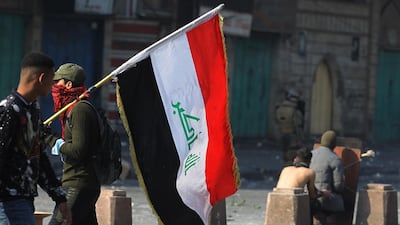The Jordanian and Iraqi governments must reverse their decisions to suspend the work of an Iraqi television station that is airing intensive coverage of the anti-government protests, rights groups said on Thursday.
Iraqi authorities this week suspended the Amman-based Dijla television station for a month, according to media sources as well as raiding its office in Baghdad.
The Jordanian Media Commission ordered the channel to stop broadcasting for one month for allegedly violating its licensing agreement. The channel has provided daily coverage of the anti-government protests, despite pressure on its staff.
"The Committee to Protect Journalists (CJP) is very concerned about this decision because it deprives Iraqis of a source of information about the ongoing protests in Iraq," Ignacio Miguel Delgado, CPJ's Middle East and North Africa representative, told The National.
“We called on the Jordanian authorities to reverse this decision and allow Dijlah TV to resume its work,” Mr Delgado said.
Dijla’s Baghdad office was raided in the first week of protests, one of its correspondents and his cameraman were gunned down in Basra and an presenter was involved in an on-air row with the premier's military spokesman.
Dijla's Ahmad Abdelsamad, a 39-year-old correspondent, and his cameraman Safaa Ghali were shot dead by unknown gunmen for covering the government’s crackdown on demonstrators in the southern city of Basra earlier this month.
The act is a violation of national and international principles of human rights, Ali Al Bayati, a member of Iraq's Independent High Commission for Human Rights, told The National.
Mr Al Bayati said the media commission can issue a decision to deal with the TV network, even to close it, but should not use a “repressive act”.
“Unfortunately it is not the first time that some TV channels and media agents were exposed to such acts without accountability and freedom of media rights,” Mr Al Bayati said.
Baghdad has come under fire for not doing enough to protect journalists in the country.
Anti-government protesters are demanding snap elections, an independent prime minister and accountability for long-standing corruption and bloodshed.
The youth-led movement has occupied squares, blockaded streets and boycotted university classes for nearly four months.
Iraq is currently ranked near the bottom of Reporters Without Borders’ (RSF) media freedom index.
It owes its current ranking of 156 out of 180 countries to routine attacks, arbitrary detentions and intimidation of journalists by militias and pro-government groups, according to RSF.


